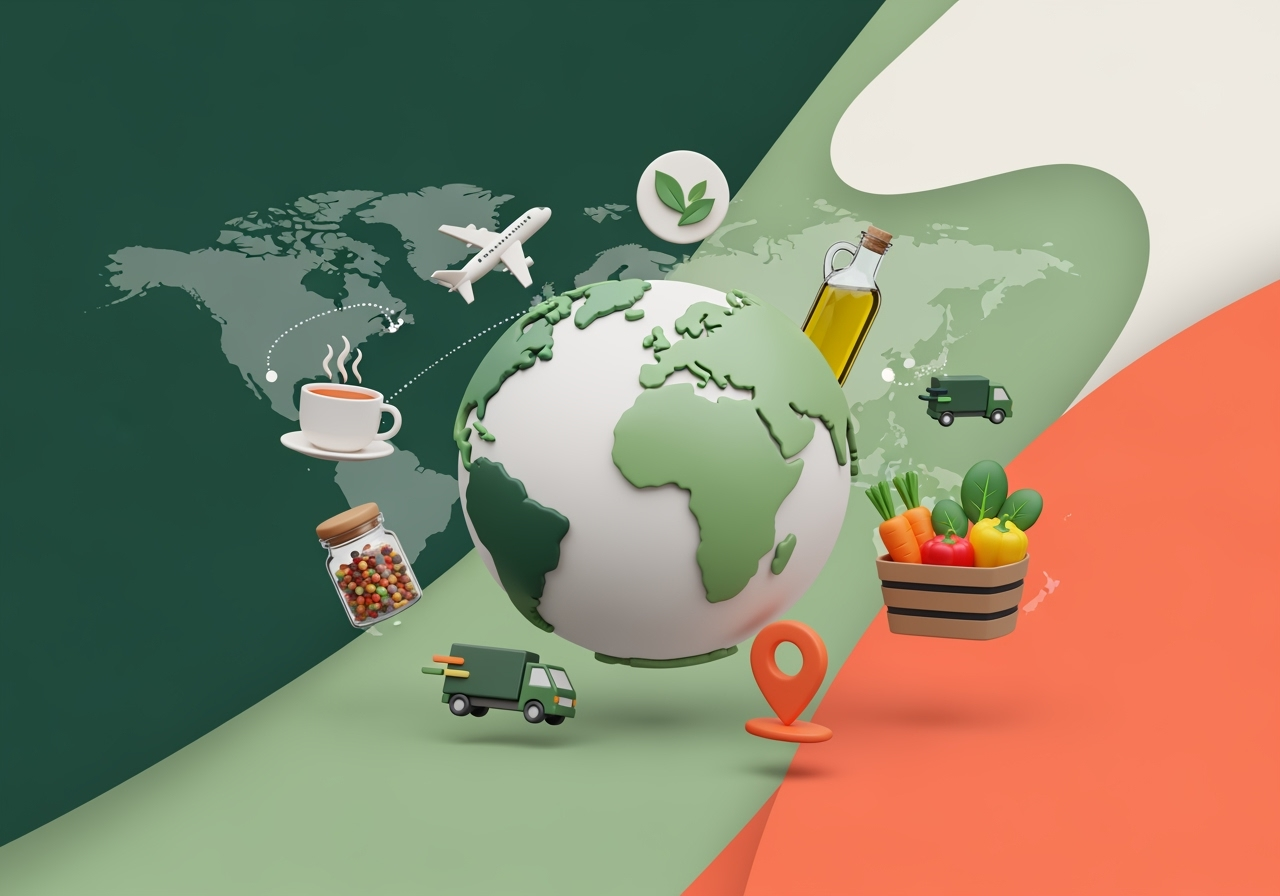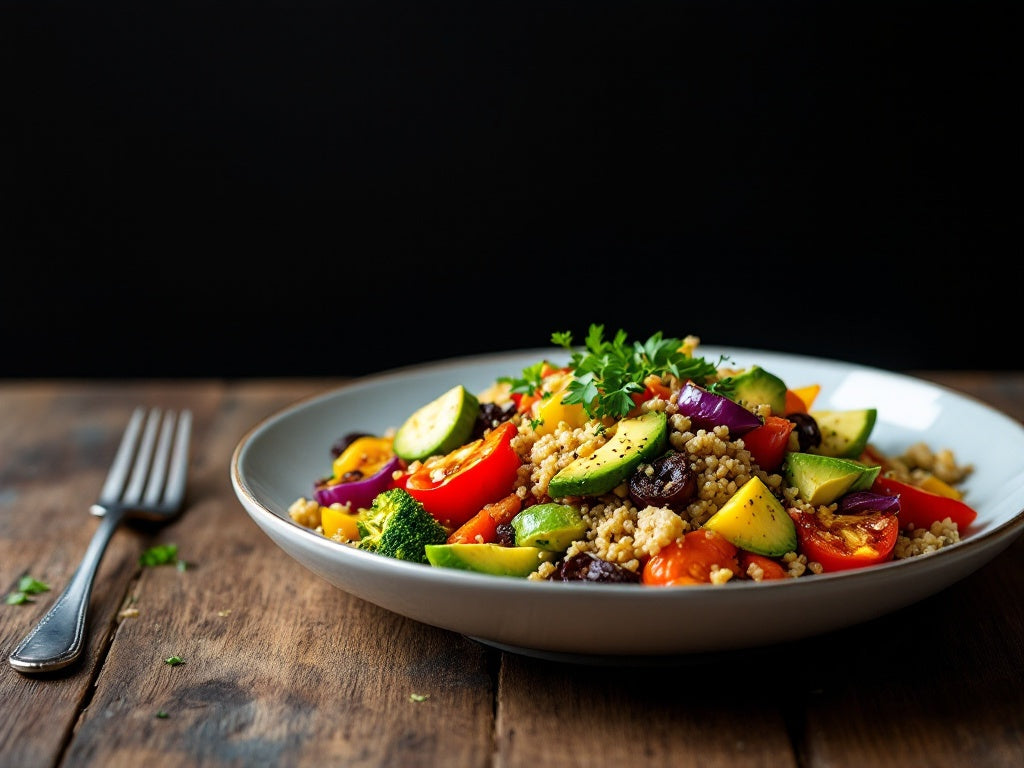Le véganisme, autrefois un mode de vie de niche, est devenu un mouvement mondial, transformant notre perception de l'alimentation, de la santé et de notre relation à la planète. Il ne s'agit plus seulement de salades : ce phénomène végétal fait fureur dans les cuisines, les restaurants et les supermarchés du monde entier. Mais qu'est-ce que le véganisme signifie exactement, et pourquoi connaît-il un tel essor ?
Prenez votre boisson préférée et rejoignez-nous pour un voyage dans le monde du végétal. Nous allons explorer un mode de vie où les légumes sont à l'honneur et où les légumineuses changent des vies. Remplie d'idées, de conseils et de conseils d'experts, cette lecture rapide de 15 minutes pourrait bien changer votre façon de penser votre prochain repas, et peut-être même votre impact sur le monde.
Partons ensemble à la découverte de l'influence du véganisme sur les individus, les communautés et la planète. Des bienfaits pour la santé à l'impact environnemental, nous explorerons les racines de ce mouvement en plein essor. Qui sait ? À la fin, vous aurez peut-être envie d'ajouter quelques plantes à votre assiette.
Qu'est-ce que le véganisme ?
Le véganisme est bien plus qu'un simple régime alimentaire ; c'est un mode de vie complet qui va au-delà de l'assiette. Fondamentalement, le véganisme s'abstient de toute consommation de produits animaux dans tous les aspects de la vie, et s'appuie sur une philosophie qui rejette le statut de marchandise des animaux. Cela signifie éviter non seulement la viande et le poisson, mais aussi les produits laitiers, les œufs, le miel et tout autre ingrédient d'origine animale dans l'alimentation. Mais ce n'est pas tout : être véritablement végan signifie aussi éviter les produits animaux dans les vêtements (comme le cuir ou la laine), les cosmétiques et autres objets du quotidien.
L'histoire du véganisme :
Si le végétarisme a des racines anciennes, le véganisme tel que nous le connaissons aujourd'hui est un concept relativement moderne. Le terme « végan » a été inventé en 1944 par Donald Watson, lorsqu'il a cofondé la Vegan Society en Angleterre. Ce mouvement, initialement axé sur l'alimentation, a depuis évolué vers un mode de vie plus large et une position éthique.
Pourquoi les gens choisissent le véganisme :
1. Avantages pour la santé :
Un régime végétalien bien planifié peut fournir tous les nutriments dont votre corps a besoin tout en offrant potentiellement de nombreux avantages pour la santé. Des recherches ont montré que les régimes végétaliens ont tendance à être plus riches en fibres, en antioxydants et en composés végétaux bénéfiques. Ils sont souvent plus faibles en graisses saturées et en cholestérol, ce qui peut contribuer à une meilleure santé cardiaque.
- Risque réduit de maladie cardiaque : les régimes à base de plantes sont associés à une pression artérielle et à un taux de cholestérol plus faibles.
- Risque réduit de certains cancers : certaines études suggèrent que les régimes végétaliens peuvent réduire le risque de cancer colorectal et de la prostate.
- Meilleure gestion du diabète de type 2 : les régimes à base de plantes peuvent améliorer la sensibilité à l’insuline et réduire le besoin de médicaments dans certains cas.
- Gestion du poids : les régimes végétaliens sont souvent moins caloriques et peuvent être efficaces pour la perte et le maintien du poids.
2. Préoccupations environnementales :
L’impact environnemental de nos choix alimentaires est devenu de plus en plus évident, et beaucoup se tournent vers le véganisme comme moyen de réduire leur empreinte écologique.
- Réduction des émissions de gaz à effet de serre : L’agriculture animale contribue de manière significative au réchauffement climatique, étant responsable d’environ 14,5 % des émissions mondiales de gaz à effet de serre.
- Conservation de l'eau : La production d'aliments d'origine végétale nécessite généralement moins d'eau que celle de produits d'origine animale. Par exemple, il faut environ 15 000 litres d'eau pour produire 1 kg de bœuf, contre 287 litres pour 1 kg de pommes de terre.
- Efficacité de l’utilisation des terres : l’agriculture végétale nécessite généralement moins de terres que l’élevage, ce qui permet potentiellement de libérer des terres pour la reforestation ou d’autres utilisations.
- Protection de la biodiversité : L’élevage à grande échelle conduit souvent à la destruction des habitats et à la perte de biodiversité.
3. Bien-être animal :
Pour beaucoup, le véganisme vise avant tout à réduire la souffrance animale. Cet aspect du véganisme prend en compte les implications éthiques de l'utilisation des animaux pour l'alimentation, l'habillement ou toute autre fin.
- Préoccupations liées à l’élevage industriel : Les conditions de vie dans les exploitations d’élevage à grande échelle soulèvent souvent d’importants problèmes de bien-être animal.
- L’intelligence émotionnelle des animaux : Les recherches croissantes sur la cognition et les émotions animales ont conduit de nombreuses personnes à reconsidérer l’éthique de l’utilisation des animaux.
- Étendre la compassion : De nombreux végétaliens pensent que s’il est possible de bien vivre sans nuire aux animaux, nous avons l’obligation éthique de le faire.
4. Considérations éthiques :
Au-delà du bien-être animal, le véganisme englobe souvent des considérations éthiques plus larges sur notre relation avec le monde qui nous entoure.
- Sécurité alimentaire mondiale : Certains affirment qu’une transition mondiale vers des régimes alimentaires à base de plantes pourrait contribuer à lutter contre la faim dans le monde en utilisant les ressources plus efficacement.
- Droits des travailleurs : Des inquiétudes existent quant aux conditions de travail dans les abattoirs et autres exploitations d’élevage.
- Résistance aux antibiotiques : L’utilisation généralisée d’antibiotiques dans l’élevage contribue au problème croissant des bactéries résistantes aux antibiotiques.
L'impact du véganisme :
Sur la santé :
De nombreuses études ont démontré les bienfaits potentiels d'une alimentation végétalienne bien planifiée pour la santé. Une analyse exhaustive publiée dans le Journal of the American Heart Association a révélé que les régimes végétaliens étaient associés à un risque moindre de maladies cardiaques, d'hypertension artérielle, de diabète et d'obésité. Cependant, il est important de noter que tous les régimes végétaliens ne sont pas forcément sains ; une planification adéquate est essentielle pour garantir la satisfaction de tous les besoins nutritionnels.
Sur l'environnement :
L'impact environnemental du véganisme peut être considérable. Une étude publiée dans la revue Science a révélé que renoncer à la viande et aux produits laitiers est l'un des moyens les plus efficaces de réduire son impact environnemental sur la planète. Si tout le monde devenait végan, l'utilisation des terres agricoles mondiales pourrait être réduite de 75 %, soit une superficie équivalente à celle des États-Unis, de la Chine, de l'Australie et de l'Union européenne réunis.
Sur le bien-être animal :
L'essor du véganisme a suscité une prise de conscience accrue des droits des animaux et a entraîné des changements dans divers secteurs. Par exemple, de nombreuses entreprises de cosmétiques proposent désormais des produits non testés sur les animaux, et on observe une forte augmentation du développement d'alternatives aux matières d'origine animale dans la mode et d'autres secteurs.
Adopter des options végétaliennes :
Chez The Food is Good, LC, nous comprenons l'importance de répondre à la diversité des besoins alimentaires et des considérations éthiques. C'est pourquoi nombre de nos produits sont végétaliens, permettant à chacun de savourer des options délicieuses et saines sans compromettre ses valeurs.
- Nos vinaigrettes biologiques : Fabriquées avec des ingrédients végétaux de haute qualité, ces vinaigrettes ajoutent de la saveur à vos repas sans aucun produit animal.
- Marinades adaptées au régime cétogène : Parfaites pour ceux qui suivent un régime cétogène à base de plantes, nos marinades sont conçues pour rehausser la saveur des légumes et des protéines végétales.
- Sauces piquantes végétaliennes : Ajoutez du piquant à vos plats avec notre gamme de sauces piquantes certifiées végétaliennes, préparées à partir de piments et d'épices soigneusement sélectionnés.
- Infusions de thé : Notre collection de tisanes et de tisanes aux fruits offre une variété de saveurs pour convenir à tous les palais, toutes 100 % végétaliennes.
Conseils pour intégrer des choix végétaliens :
1. Commencez petit :
Pas besoin de devenir végétalien du jour au lendemain. Essayez d'intégrer un ou deux repas végétaliens par semaine pour commencer. Notre série de recettes « Lundi sans viande », avec nos assaisonnements végétaliens, est un excellent point de départ.
2. Explorez de nouvelles saveurs :
Le véganisme ouvre un monde de nouvelles saveurs et textures. Notre gamme de sauces piquantes et d'assaisonnements végétaliens rehausse vos plats à base de plantes et vous permet de découvrir de nouveaux plats préférés.
3. Lisez les étiquettes :
Prenez l'habitude de vérifier la liste des ingrédients. Recherchez l'étiquette « végan » sur nos produits pour les identifier facilement. N'oubliez pas que certains produits apparemment végétaliens peuvent contenir des ingrédients d'origine animale cachés, comme la caséine, le lactosérum ou la gélatine.
4. Planifiez votre alimentation :
Assurez-vous d'obtenir tous les nutriments nécessaires en intégrant une variété de fruits, de légumes, de céréales complètes, de légumineuses, de noix et de graines à votre alimentation. Envisagez des suppléments de nutriments comme la vitamine B12, plus difficile à obtenir à partir de sources végétales.
5. Rejoignez la communauté :
Rejoignez d'autres curieux dans notre Club Gourmet et Goût pour des idées de recettes véganes, du soutien et des conseils. Partager ses expériences et ses recettes peut rendre la transition vers un mode de vie végan beaucoup plus facile et agréable.
6. Soyez prêt :
Lorsque vous mangez au restaurant ou voyagez, il peut être utile de planifier à l'avance. De nombreux restaurants proposent désormais des options végétaliennes, mais il est toujours conseillé de consulter les menus à l'avance ou d'emporter des en-cas végétaliens.
7. Expérimentez avec la cuisine :
Essayez de nouvelles recettes et techniques de cuisine. La cuisine végétalienne peut être incroyablement créative : de la fabrication de fromage à partir de noix à l'utilisation d'aquafaba (le liquide des pois chiches en conserve) comme substitut d'œuf en pâtisserie.
Défis et considérations :
Bien que le véganisme offre de nombreux avantages, il est important de reconnaître qu’il peut s’accompagner de défis :
Considérations nutritionnelles :
Les végétaliens doivent s’assurer qu’ils consomment suffisamment de protéines, de fer, de calcium, de vitamine D, de vitamine B12 et d’acides gras oméga-3.
- Situations sociales : Manger au restaurant ou assister à des rassemblements sociaux peut parfois être un défi pour les végétaliens, même si cela devient plus facile à mesure que le véganisme devient plus courant.
- Coût : Bien qu’un régime végétalien de base puisse être très économique, certains produits végétaliens spécialisés peuvent être chers.
- Temps et efforts : Au début, adopter un régime végétalien peut nécessiter plus de temps pour la planification et la préparation des repas.
Ce que disent les détracteurs :
Bien que le véganisme ait gagné en popularité, il n'est pas exempt de critiques. Il est important de prendre en compte les points de vue suivants pour une vision équilibrée :
1. Préoccupations nutritionnelles :
Certains nutritionnistes affirment qu’un régime végétalien peut entraîner des carences en certains nutriments, notamment :
- Vitamine B12 : Principalement présente dans les produits d’origine animale, les végétaliens ont souvent besoin de prendre des suppléments.
- Fer : Bien que présent dans les aliments végétaux, il est moins biodisponible que dans les sources animales.
- Acides gras oméga-3 : La forme ALA d’origine végétale est moins efficacement convertie par l’organisme que l’EPA et le DHA d’origine animale.
2. Débats sur l’impact environnemental :
- Certains affirment que tous les aliments végétaux ne sont pas respectueux de l’environnement, citant des exemples comme la culture d’amandes, qui nécessite beaucoup d’eau, ou l’empreinte carbone des fruits exotiques importés.
- D’autres soutiennent qu’un élevage bien géré peut contribuer à la santé des sols et à la biodiversité.
3. Considérations économiques et culturelles :
- Les critiques soulignent que le véganisme peut être coûteux ou peu pratique dans certaines régions du monde où les options à base de plantes sont limitées.
- Des inquiétudes existent quant à l’impact sur les communautés agricoles traditionnelles et les pratiques culturelles centrées sur les produits animaux.
4. Santé et performance :
- Certains athlètes et amateurs de fitness affirment qu’un régime végétalien peut ne pas fournir suffisamment de protéines pour le développement musculaire et la récupération.
- Il existe des débats sur les effets à long terme des régimes végétaliens sur la santé, en particulier pour les enfants et les femmes enceintes.
5. Aliments végétaliens transformés :
- Alors que le marché des produits végétaliens se développe, des critiques se font jour à l'encontre des alternatives végétaliennes hautement transformées qui ne sont peut-être pas plus saines que leurs homologues d'origine animale.
Chez The Food is Good, LC, nous croyons en l'importance d'une information équilibrée. Bien que nous proposions de nombreux produits végétaliens, nous encourageons nos clients à prendre des décisions éclairées en fonction de leurs besoins de santé, de leurs convictions éthiques et de leur situation.
L'avenir du véganisme :
Avec la prise de conscience croissante des enjeux sanitaires, environnementaux et éthiques, le véganisme est appelé à devenir de plus en plus courant. On observe déjà un essor des alternatives végétales à la viande et aux produits laitiers, et cette tendance devrait se poursuivre. Chez The Food is Good, LC, nous nous engageons à être à l'avant-garde de ce mouvement et à élargir continuellement notre gamme d'options véganes délicieuses, nutritives et éthiques.
Que vous soyez un végan convaincu, que vous réfléchissiez à ce mode de vie ou que vous souhaitiez simplement intégrer davantage d'options végétales à votre alimentation, comprendre le véganisme est essentiel dans un monde aujourd'hui soucieux de sa santé et de l'environnement. Chez The Food is Good, LC, nous sommes fiers de proposer une variété de produits végétaliens qui facilitent et rendent plus savoureux l'expérience d'un mode de vie végétal.
N'oubliez pas : chaque petit pas vers une alimentation plus végétale peut faire la différence – pour votre santé, pour les animaux et pour notre planète. Pourquoi ne pas vous lancer dès aujourd'hui dans l'aventure végétalienne avec nos délicieuses options végétaliennes ? Que vous souhaitiez essayer une nouvelle vinaigrette, expérimenter avec nos sauces piquantes ou rejoindre notre Club Gourmet pour une inspiration continue, nous sommes là pour vous accompagner dans votre aventure végétalienne.
S'engager auprès de la communauté végétalienne :
Nous encourageons nos lecteurs à se joindre à la conversation ! Partagez vos idées, expériences et questions dans les commentaires ci-dessous. Avez-vous déjà testé nos produits végétaliens ? Quelle est votre recette végétalienne préférée avec nos assaisonnements ou sauces ? Vos conseils pourraient aider d'autres personnes à adopter le véganisme !
N'oubliez pas de nous suivre sur les réseaux sociaux pour des conseils, des recettes et des produits vegan quotidiens. Rejoignez notre Club Foodie & Sip pour du contenu vegan exclusif et rejoignez notre communauté grandissante d'amateurs de cuisine soucieux de leur santé et de l'environnement.
Ensemble, nous pouvons explorer le monde du véganisme, une délicieuse bouchée à la fois !
Remarques :
-
Avantages pour la santé : Pour les études les plus récentes sur les régimes végétaliens et leurs effets sur la santé, les lecteurs devraient consulter des revues à comité de lecture en nutrition et en épidémiologie, telles que l'American Journal of Clinical Nutrition ou le British Journal of Nutrition.
-
Impact environnemental : Pour obtenir des données actuelles sur l’impact environnemental des différents régimes alimentaires, les lecteurs peuvent se référer aux rapports des agences environnementales ou aux publications récentes dans des revues scientifiques environnementales.
-
Impact mondial du véganisme : Pour connaître les dernières recherches sur l’impact environnemental du véganisme, les lecteurs doivent rechercher des études récentes dans des revues scientifiques environnementales et des rapports d’organisations environnementales internationales.
-
Défis et considérations : Pour connaître les stratégies actuelles visant à relever ces défis, les lecteurs peuvent explorer les guides récents sur le mode de vie végétalien, les directives nutritionnelles des associations de diététique ou les études en sciences sociales sur le véganisme.
-
L'avenir du véganisme : Pour connaître les prévisions et les tendances concernant l'avenir du véganisme, les lecteurs doivent rechercher les prévisions des analystes de l'industrie alimentaire, les rapports sur l'avenir de l'alimentation ou les entretiens avec des experts en innovation végétale.
Note générale : Le paysage du véganisme étant en constante évolution, les lecteurs sont encouragés à rechercher les informations les plus récentes auprès de sources fiables pour rester informés des tendances, des recherches et des développements actuels dans le monde de la vie à base de plantes.
Pour obtenir des informations à jour sur des sujets spécifiques mentionnés dans ce blog, notamment les avantages pour la santé, l'impact environnemental, l'adoption culturelle et les considérations éthiques, veuillez consulter des revues et des rapports récents évalués par des pairs provenant d'organisations réputées et des publications universitaires dans des domaines pertinents.
Les auteurs suivants sont issus d'horizons divers, notamment afro-américains, asiatiques, indiens, coréens, nigérians, etc. Ces ouvrages offrent des perspectives diverses sur le véganisme, la cuisine végétale et la manière dont différentes cultures abordent l'alimentation végétale. Ils offrent une vision plus inclusive du véganisme et des modes de vie végétaliens dans différents contextes culturels.
-
« Afro-Vegan : Saveurs africaines, caribéennes et du Sud fraîches de la ferme remixées » par Bryant Terry (2014) Focus : Recettes végétaliennes inspirées des cuisines africaines, caribéennes et du Sud
-
« The Invisible Vegan » de Jasmine C. Leyva (2019) Objectif : explore le problème des habitudes alimentaires malsaines dans la communauté afro-américaine
-
« Le Royaume des légumes : le monde abondant des recettes végétaliennes » par Bryant Terry (2020) Thème : Cuisine végétalienne axée sur les légumes
-
« L'Orient rencontre le véganisme : le meilleur de la cuisine maison asiatique, végétale et délicieuse » par Sasha Gill (2019) Focus : recettes véganes d'inspiration asiatique
-
« La cuisine indienne végétalienne de Richa : recettes traditionnelles et créatives pour le cuisinier amateur » par Richa Hingle (2015) Thème : cuisine végétalienne indienne
-
« Le livre de cuisine végétalien coréen : réflexions et recettes de la cuisine d'Omma » par Joanne Lee Molinaro (2021) Focus : recettes végétaliennes d'inspiration coréenne et histoires personnelles
-
« Vegan Soul Food Cookbook: Plant-Based, No-Fuss Southern Favorites » par Nadira Jenkins-El (2020) Focus : Versions végétaliennes de plats traditionnels de soul food
-
« Mexique végétalien : des recettes régionales réconfortantes, des tamales aux tostadas » par Jason Wyrick (2016) ; thème : cuisine végétalienne d'inspiration mexicaine.
-
« Sweet Potato Soul : 100 recettes végétaliennes faciles pour les saveurs du Sud de la fumée, du sucre, des épices et de l'âme » par Jenné Claiborne (2018) Focus : recettes végétaliennes d'inspiration sudiste
-
« Ageless Vegan : Le secret d'une vie longue et saine à base de plantes » par Tracye McQuirter (2018) Sujet : Les bienfaits pour la santé d'un mode de vie végétalien du point de vue afro-américain
-
« Le livre de cuisine végétalien nigérian : recettes nigérianes à base de plantes » par Tomi Makanjuola (2020). Sujet : recettes végétaliennes d'inspiration nigériane.
-
« L'Afrique végétalienne : recettes végétales de l'Éthiopie au Sénégal » par Marie Kacouchia (2022) Thème : Recettes végétaliennes de diverses cuisines africaines





